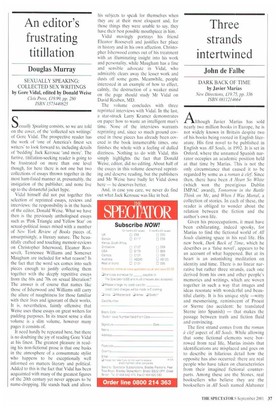An editor's frustrating titillation
Douglas Murray
SEXUALLY SPEAKING: COLLECTED SEX WRITINGS by Gore Vidal, edited by Donald Weise Cleis Press, £19.99, pp. 280 ISBN 1573440825 Sexually Speaking consists, so we are told on the cover, of the 'collected sex writings' of Gore Vidal. The prospective reader has the work of 'one of America's finest sex writers' to look forward to, including details of 'bedding Jack Kerouac 'and more'. The furtive, titillation-seeking reader is going to be frustrated on more than one level though, for here there is not one but two collections of essays thrown together in the most ham-fisted manner at, presumably, the instigation of the publisher, and none live up to the distasteful jacket hype.
Vidal himself did not put together this selection of reprinted essays, reviews and interviews: the responsibility is in the hands of the editor, Donald Weise. What we have then is the previously anthologised essays such as 'Pink Triangle and Yellow Star' on sexual-political issues mixed with a number of New York Review of Books pieces of, unsurprisingly, a literary nature. The beautifully crafted and touching memoir-reviews on Christopher Isherwood, Eleanor Roosevelt, Tennessee Williams and Somerset Maugham are included for what reason? Is the fact that the word sex comes into such pieces enough to justify collecting them together with the deeply repetitive essays from the 60s and 70s on sexual liberation? The answer is of course that names like those of Isherwood and Williams still carry the allure of naughtiness for those familiar with their lives and ignorant of their works. It is. nevertheless, faintly offensive that Weise uses these essays on great writers for padding purposes. In its truest sense a slim volume is a slim volume, however many pages it consists of.
It need hardly be repeated here, but there is no doubting the joy of reading Gore Vidal at his finest. The greatest pleasure in reading his non-fictional prose is that one basks in the atmosphere of a consummate stylist who happens to be exceptionally well informed on matters literary and political. Added to this is the fact that Vidal has been acquainted with many of the greatest figures of the 20th century yet never appears to be name-dropping. He stands back and allows his subjects to speak for themselves when they are at their most eloquent and, for those things they were unable to say, they have their best possible mouthpiece in him.
Vidal movingly portrays his friend Eleanor Roosevelt and justifies her place in history and in his own affection. Christopher Isherwood comes out of his treatment with an illuminating insight into his work and personality, while Maugham has a fine and sensible advocate in Vidal, who admirably clears away the lesser work and dusts off some gems. Meanwhile, people interested in an example of how to effect, calmly, the destruction of a weaker mind on the page should study Mr Vidal on David Reuben, MD.
The volume concludes with three reprinted interviews with Vidal. In the last, a star-struck Larry Kramer demonstrates on paper how to waste an intelligent man's time. None of the interviews warrants reprinting and, since so much ground covered in these pieces has already been covered in the book innumerable times, one finishes the whole with a feeling of dulled dizziness. Nothing to do with Vidal, this simply highlights the fact that Donald Weise, editor, did no editing. About half of the essays in this volume deserved reprinting and deserve reading, but the publishers and Mr Weise have badly let Vidal down here — he deserves better.
And, in case you care, we never do find out what Jack Kerouac was like in bed.


































































 Previous page
Previous page